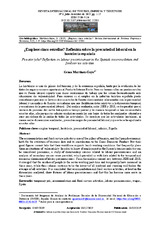¿Empleos cinco estrellas? Reflexión sobre la precariedad laboral en la hostelería española
Five-star jobs? Reflection on labour precariousness in the Spanish accommodation and food service activities
Autor
Martínez-Gayo, Gema
Editor
UCOPressFecha
2019Materia
Empleo temporalHostelería
Precariedad laboral
Salarios
España
Temporary job
Accommodation and food service activities
Labour precariousness
Wages
Spain
METS:
Mostrar el registro METSPREMIS:
Mostrar el registro PREMISMetadatos
Mostrar el registro completo del ítemResumen
La hostelería es uno de pilares del turismo, y de la economía española, tanto por la evolución de los datos de negocio como su aportación al Producto Interior Bruto. Pero sus buenas cifras no pueden ocultar que su fuerza laboral soporta unas duras condiciones de trabajo que los sitúan frecuentemente ante situaciones de vulnerabilidad. Para conocer si el empleo en la industria turística española puede considerarse precario se llevó a cabo un estudio de fuentes documentales relacionadas con la precariedad laboral y un análisis de fuentes secundarias que nos facilitaron datos relativos a la dimensión temporal y económica de la precariedad laboral. Del análisis realizado, entre 2008 y 2018, se desprendió que el número de personas del sector trabajando a tiempo parcial y de manera temporal se han incrementado en estos años, a la par que sus salarios continúan siendo los más bajos de todos los analizados situándose muy por debajo de la media de todas las actividades. Se concluye que las actividades hosteleras, al menos en las dimensiones analizadas, presentan rasgos de precariedad laboral y que ésta se ha agudizado en estos años. The accommodation and food service industry is one of the pillars of tourism, and the Spanish economy, both for the evolution of business data and its contribution to the Gross Domestic Product. But their good figures cannot hide that their workforce supports harsh working conditions that frequently place them in situations of vulnerability. In order to know if employment in the Spanish tourism industry can be considered precarious, a study of documentary sources related to labour precariousness and an analysis of secondary sources were provided, which provided us with data related to the temporal and economic dimension of labour precarioussness. From the analysis carried out, between 2008 and 2018, it emerged that the number of people in the sector working part-time and temporarily have increased in these years, while their salaries continue to be the lowest of all analyzed and standing well below the average of all activities. It is concluded that accommodation and food service activities, at least in the dimensions analyzed, show features of labour precariousness and that this has become more acute in these years.

